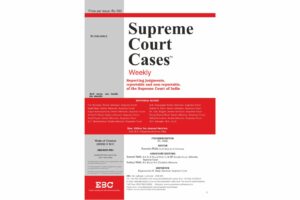Civil Procedure Code, 1908 — Ss. 9-A and 3 — Bar of limitation: Jurisdiction of court to decide bar of limitation, as preliminary issue by invocation of S. 9-A, when available, explained. [Kamgar Swa Sadan Coop. Housing Society Ltd. v. Vijaykumar Vitthalrao Sarvade, (2022) 6 SCC 685]
Consumer Protection Act, 1986 — S. 23 — Appeal to Supreme Court — Provision of law applicable after coming into force of the 2019 Act: S. 23 of the 1986 Act provide that no appeal shall be entertained by Supreme Court unless the person who is required to pay the amount deposits 50% of the amount or Rs 50,000, whichever is less is not applicable to the complaints filed prior to the commencement of the 2019 Act. [ECGC Ltd. v. Mokul Shriram EPC JV, (2022) 6 SCC 704]
Contempt of Court — Civil Contempt — Wilful disobedience/contumacious conduct: Non-compliance with mandatory Court direction requiring respondent-alleged contemnors to deposit 50% of the sum awarded in arbitration to be considered as contempt of court due to wilful disobedience. Contention that non-compliance with the condition of deposit would only render the arbitrator’s award executable and that such failure to comply would not amount to contempt of court, rejected. [Urban Infrastructure Real Estate Fund v. Dharmesh S. Jain, (2022) 6 SCC 662]
Contract Act, 1872 — Claim of restitution under S. 65, when the contract is found to be void on ground of illegality — Role of party claiming restitution in relation to such illegality — Relevance of: Principle of in pari delicto for denial of restitution is applicable where the claimant is more responsible for the illegality or the parties are considered to be equally responsible. In adjudicating a claim of restitution under S. 65 of the Contract Act, held, the court must determine the illegality which caused the contract to become void, and, the role the party claiming restitution has played in it. If the party claiming restitution was equally or more responsible for the illegality (in comparison to the defendant), there shall be no cause for restitution. [Loop Telecom & Trading Ltd. v. Union of India, (2022) 6 SCC 762]
Criminal Procedure Code, 1973 — S. 439 — Grant of bail: Law summarised regarding factors to be considered and necessity of recording essential reasons for grant of bail; grounds on which challenge to bail order, or application for cancellation of bail is permissible. [Kamla Devi v. State of Rajasthan, (2022) 6 SCC 725]
Insurance — Contract of Insurance/Policy/Terms/Cover Note — Exemption/ Exclusion/Restriction/Limitation/Forfeiture Clauses/Negative Covenants — Standard Fire and Special Perils Policy — Exclusion clause in policy — Interpretation: When the policy itself defined the acts of terrorism in the exclusion clause, the terms of the policy being a concluded contract will govern the rights and liabilities of the parties. Therefore, parties cannot rely upon definitions of “terrorism” in various penal statutes since the exclusion clause contained an exhaustive definition of acts of terrorism. [Narsingh Ispat Ltd. v. Oriental Insurance Co. Ltd., (2022) 6 SCC 654]
Monopolies and Restrictive Trade Practices Act, 1969 — Ss. 36-A, 36-B(a) and (d), 36-D and 36-E r/w Ss. 2(i) and 2(o) — Unfair trade practice — Non-establishment of: Delay in handing over of possession of constructed flat by developer, when does not amount to unfair practice, explained. Relevance of non-termination of buyer agreement by allottee on account of delay and absence of such ground/allegation in complaint, determined. Effect of provision in the buyers agreement for extension of time of delivery, also explained. [B.B. Patel v. DLF Universal Ltd., (2022) 6 SCC 742]
Negotiable Instruments Act, 1881 — S. 139 — Rebuttable presumption — Probable defence: Accused can rebut the presumption by establishing probable defence that no consideration was received from complainant. [Tedhi Singh v. Narayan Dass Mahant, (2022) 6 SCC 735]
Probation of Offenders Act, 1958 — Ss. 3 and 4: Benefit of releasing convicted accused on probation, when to be granted, explained. [Som Dutt v. State of H.P., (2022) 6 SCC 722]

